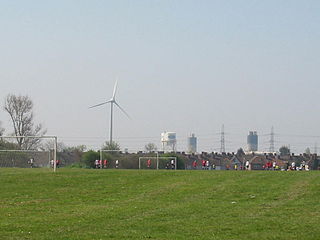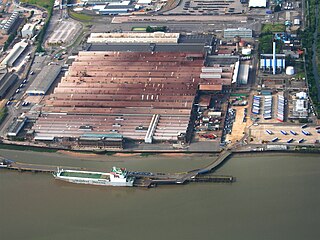
The Ford sewing machinists strike of 1968 was a landmark labour-relations dispute in the United Kingdom. It was a trigger cause of the passing of the Equal Pay Act 1970.

The Ford sewing machinists strike of 1968 was a landmark labour-relations dispute in the United Kingdom. It was a trigger cause of the passing of the Equal Pay Act 1970.
The strike, led by Rose Boland, Eileen Pullen, Vera Sime, Gwen Davis, Violet Dawson, and Sheila Douglass, began on 7 June 1968, when women sewing machinists at Ford Motor Company Limited's Dagenham plant in London walked out, followed later by the machinists at Ford's Halewood Body & Assembly plant. The women made car seat covers and as stock ran out the strike eventually resulted in a halt to all car production at the Dagenham factory.
The Dagenham sewing machinists walked out when, as part of a regrading exercise, they were informed that their jobs were graded in Category C (less skilled production jobs), instead of Category B (more skilled production jobs), and that they would be paid 15% less than the full B rate received by men. [1] [2] [3] At the time it was common practice for companies to pay women less than men, irrespective of the skills involved. [4]
Following the intervention of Barbara Castle, the Secretary of State for Employment and Productivity in Harold Wilson's government, the strike ended three weeks after it began, as a result of a deal that immediately increased their rate of pay to 8% below that of men, rising to the full category B rate the following year. A court of inquiry (under the Industrial Courts Act 1919) was also set up to consider their regrading, although this failed to find in their favour. [5] The women were only regraded into Category B following a further six-week strike in 1984. [6] [7]
Inspired by the example of the machinists, women trades unionists founded the National Joint Action Campaign Committee for Women's Equal Rights (NJACCWER), which held an "equal pay demonstration" attended by 1,000 people in Trafalgar Square on 18 May 1969. [8]
The movement ultimately resulted in the passing of the Equal Pay Act 1970, which came into force in 1975 and which did, for the first time, aim to prohibit inequality of treatment between men and women in Britain in terms of pay and conditions of employment. [9] [2] [4] [10] [11] In the second reading debate of the bill, MP Shirley Summerskill spoke of the machinists playing a "very significant part in the history of the struggle for equal pay". [12]
Once the UK joined the EEC in 1973, it also became subject to Article 119 of the 1957 Treaty of Rome, which specified that men and women should receive equal pay for equal work. [13]
Several streets in Dagenham Green, built on the site of the Ford stamping plant, are to be named for the women who led the strikes and the equal pay campaign.
A film dramatisation of the 1968 strike, Made in Dagenham , with a screenplay by William Ivory, was released at the Toronto Film Festival in September 2010. [14]
A musical adaptation of the film premièred in London in 2014. The production closed [15] on 11 April 2015. [16]

Dagenham is a town in East London, England, within the London Borough of Barking and Dagenham. Dagenham is centred 11+1⁄2 miles east of Charing Cross.

Barbara Anne Castle, Baroness Castle of Blackburn, was a British Labour Party politician who was a Member of Parliament from 1945 to 1979, making her one of the longest-serving female MPs in British history. Regarded as one of the most significant Labour Party politicians, Castle developed a close political partnership with Prime Minister Harold Wilson and held several roles in the Cabinet. She remains to date the only woman to have held the office of First Secretary of State.

William Julian Usery Jr. was an American labor union activist and government appointee who served as United States secretary of labor in the Ford administration.

The Equal Pay Act of 1963 is a United States labor law amending the Fair Labor Standards Act, aimed at abolishing wage disparity based on sex. It was signed into law on June 10, 1963, by John F. Kennedy as part of his New Frontier Program. In passing the bill, Congress stated that sex discrimination:
Equal pay for equal work is the concept of labour rights that individuals in the same workplace be given equal pay. It is most commonly used in the context of sexual discrimination, in relation to the gender pay gap. Equal pay relates to the full range of payments and benefits, including basic pay, non-salary payments, bonuses and allowances. Some countries have moved faster than others in addressing equal pay.
In the United Kingdom, as in other countries, feminism seeks to establish political, social, and economic equality for women. The history of feminism in Britain dates to the very beginnings of feminism itself, as many of the earliest feminist writers and activists—such as Mary Wollstonecraft, Barbara Bodichon, and Lydia Becker—were British.

The Sex Discrimination Act 1975 was an Act of the Parliament of the United Kingdom which protected men and women from discrimination on the grounds of sex or marital status. The Act concerned employment, training, education, harassment, the provision of goods and services, and the disposal of premises.

The Equal Pay Act 1970 was an act of the Parliament of the United Kingdom that prohibited any less favourable treatment between men and women in terms of pay and conditions of employment. The act was proposed by the then Labour government, and was based on the Equal Pay Act of 1963 of the United States. It has now been mostly superseded by part 5, chapter 3 of the Equality Act 2010.

Ford Motor Company Limited, trading as Ford of Britain, is a British wholly owned subsidiary of Ford Technologies Limited, itself a subsidiary of Ford International Capital LLC, which is a subsidiary of Ford Motor Company. Its business started in 1909 and has its registered office in Laindon, Essex. It adopted the name of Ford of Britain in 1960.
Events from the year 1968 in the United Kingdom.

The National Organization for Women (NOW) is an American feminist organization. Founded in 1966, it is legally a 501(c)(4) social welfare organization. The organization consists of 550 chapters in all 50 U.S. states and in Washington, D.C. It is the largest feminist organization in the United States with around 500,000 members. NOW is regarded as one of the main liberal feminist organizations in the US, and primarily lobbies for gender equality within the existing political system. NOW campaigns for constitutional equality, economic justice, reproductive rights, LGBTQIA+ rights and racial justice, and against violence against women.

"All or Nothing" is a song written by Steve Marriott and Ronnie Lane of the British rock band Small Faces and released as a single in 1966.

Ford Dagenham is a major automotive factory located in Dagenham, London, operated by the Ford of Britain subsidiary of Ford Motor Company. The plant opened in 1931 and has produced 10,980,368 cars and more than 39,000,000 engines in its history. It covers around 475 acres and has received over £800 million of capital investment since 2000.

Made in Dagenham is a 2010 British comedy-drama film directed by Nigel Cole, written by William Ivory, and starring Sally Hawkins, Bob Hoskins, Miranda Richardson, Geraldine James, Rosamund Pike, Andrea Riseborough, Jaime Winstone, Daniel Mays and Richard Schiff. It dramatises the Ford sewing machinists strike of 1968 that aimed for equal pay for women. Its theme song, with lyrics by Billy Bragg, is performed by Sandie Shaw, a native of the area and former Ford Dagenham clerk.
Gender pay gap in Australia looks at the persistence of a gender pay gap in Australia. In Australia, the principle of "equal pay for equal work" was introduced in 1969. Anti-discrimination on the basis of sex was legislated in 1984.

Made in Dagenham is a musical with music by David Arnold, lyrics by Richard Thomas, and a book by Richard Bean. Based on the 2010 film of the same name, which in turn was based on the real events of the Ford sewing machinists strike of 1968, the musical made its West End and world premiere at the Adelphi Theatre in 2014.
This is a Timeline of second-wave feminism, from its beginning in the mid-twentieth century, to the start of Third-wave feminism in the early 1990s.

East End Women's Museum (EEWM) is a virtual, pop-up museum and the only dedicated women's museum in England. It was established in 2015 as a positive protest to a "Jack the Ripper Museum" in Cable Street. While the EEWM sought to open a permanent location in Barking town centre in 2023, the museum faced difficulties finalising the lease. The museum continues to have a pop-up museum that hosts temporary exhibitions—both online and in-person—as well as community workshops and educational events.

The Wages of Men and Women: Should They be Equal? is a book written by English sociologist, economist, socialist and social reformer Beatrice Webb. It deals with equal pay for equal work and the basic principles that should apply to men's and women's wages. First published by the Fabian Society in 1919, the book is a minority report in which Webb criticizes the main purpose and findings of the War Cabinet Committee on Women in Industry. Webb was herself a member of the Committee, which was to investigate whether women who worked in occupations that had been considered men's work before the war were in fact receiving equal pay, and also to establish the principles that would determine the relationship between men's and women's wages.